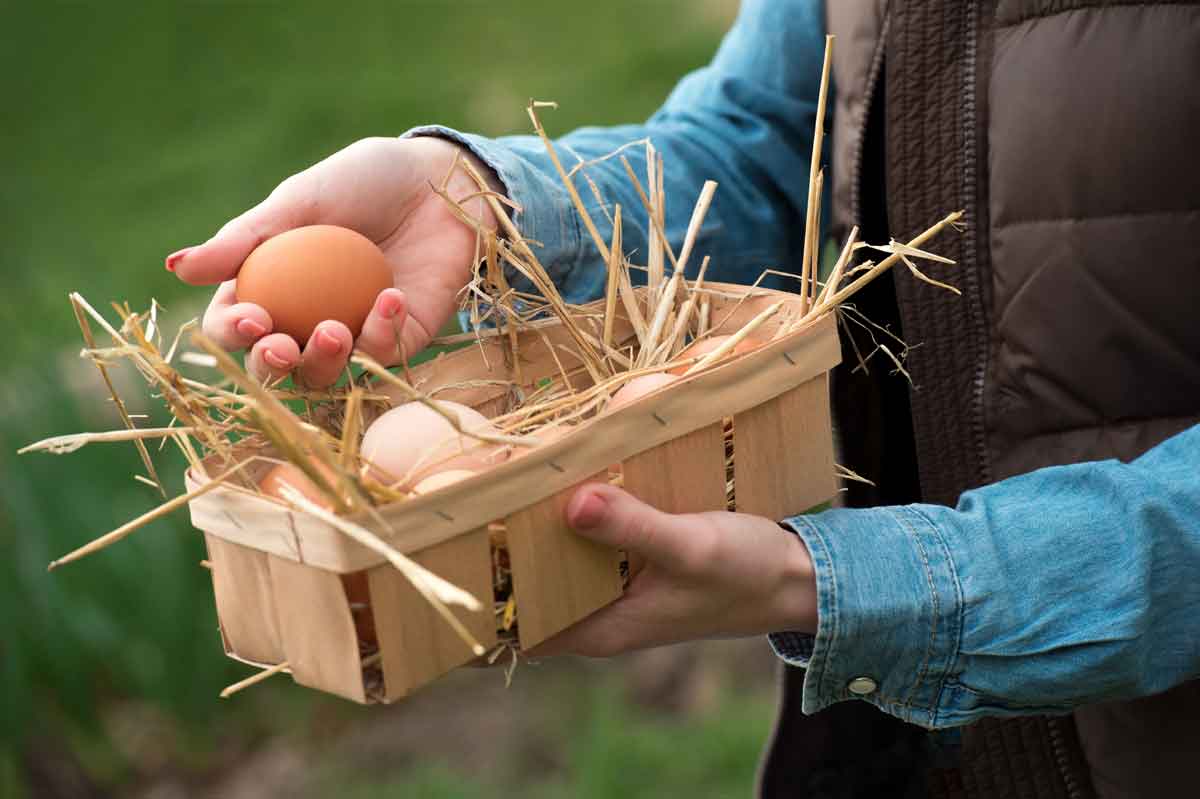Knowing the proper methods of cleaning and storing fresh chicken eggs will help maximize the benefit of your hens hard work.
In addition to being more flavorful, fresh chicken eggs offer greater nutritional value. More specifically, they have less cholesterol, less saturated fat and a higher content of vitamins A, E and D.
That said, there are a couple of things you should know if you’re interested in keeping chicken for their eggs. We’re referring to the technique of collecting, cleaning and storing farm-fresh eggs. Read on to learn more.
Collecting Chicken Eggs
Before you get to cleaning, you first have to gather your farm-fresh eggs. One of the reasons why you should pay attention to the collection process is because it can minimize the amount of cleaning you’ll need to do later.
As a rule of thumb, you should collect your chicken eggs as early as you can. Experts recommend collecting them twice per day, preferably early in the morning and early in the afternoon.
This way, you won’t end up with poop-stained eggs because they’ve been sitting in the nest all night long.
Another tip that helps reduce the extent of cleaning required is to ensure the nest boxes are well-feathered. In the event that you find poop when collecting the eggs, be sure to clean the boxes well afterwards and replace the shavings or straw lining.
Similarly, if there’s a broken egg, you’ll need to remove any soiled straw and replace it with fresh one.

Cleaning Chicken Eggs
Even though you can store your farm-fresh eggs without washing them, it’s a good idea to, especially if you’re using them to cook.
If you’ve never cleaned chicken eggs, you’re likely to make the mistake of washing them in ice-cold water. The problem with using extremely cold water is that it shifts the position of naturally-occuring bacteria. Instead of the bacteria remaining on the eggshell pores, the cold water draws them to the inside of the egg where you don’t want them.
Another point you should keep in mind is that uncleaned eggs contain an antibacterial coating known as bloom. By washing the eggs in extremely cold water, it eliminates the bloom, therefore encouraging formation of bacteria.
There are two techniques of cleaning eggs. You can choose to dry clean or wet clean them.

Dry Cleaning
Dry cleaning is the most recommended method. It entails using a dry and slightly abrasive substance to remove any dirt on the eggs. A key advantage of this method is that it keeps the bloom intact. Plus, it’s way easier than wet cleaning.
The best elements you can use to dry clean are a sanding sponge, fine sandpaper or loofah. Regardless of what you use, it’s important that you sanitize the material every once in a while. Alternatively, you can discard the used sponge and use a brand new one instead.

Wet Cleaning
There are instances where dry cleaning just won’t cut it. For instance, if you have poop-stained eggs in your hands, no amount of dry cleaning will get the job done.
If you have to wet wash your eggs, be sure to use warm water. The temperature of the water should be higher than that of the eggs. Still, it shouldn’t be too hot or lukewarm. Adhere to these steps:
- Avoid immersing or leaving your eggs to stand in water
- Avoid washing the eggs under running water. You also shouldn’t spray them in washer flats or wire baskets. Just let them sit in water for a short while then wipe them using a dry paper towel. Afterwards, place them in a different basket or flat for drying
- Another way to remove tough stains from your eggs is by spray-cleaning them. You can use a solution of bleach diluted with water.
- If the stains still don’t come off after using water and sanitizing spray, try soaking the eggs in warm vinegar.
- TIP: Using an “Egg Cleanser” solution will allow you to clean away any dirt, debris or poop without removing the protective bloom.

Storing Chicken Eggs
After cleaning and drying your eggs, the only thing left is to store them properly. The easiest way to go about this is to pack them nicely in egg cartons. Remember to label each carton, indicating the date you collected the eggs.
After packaging them, the ideal place to store them is in a refrigerator. However, this mainly depends on the cleaning method you used.
If you wet-cleaned, then you have to refrigerate them and if you dry-cleaned, you can either refrigerate or store them at room temperature. If you don’t plan to use your farm-fresh eggs for a long time, it’s best to refrigerate as they last longer this way.

Tracking the Age
Important to note though is that you should use your chicken eggs within a month of collecting them even with refrigeration. They may still be usable a couple of weeks after the one-month period, but it’s better to bake or hard-boil older eggs.
Unfortunately, most people don’t keep track of how long they keep their chicken eggs in the fridge. Luckily, there are several ways of testing their freshness before cooking them. These include:
- A sniff test- if the eggs are rotten, they’ll have an unmistakable smell
- A visual inspection- if the eggs are bad, the shells will likely be cracked, powdery or slimy
- A float test- a foolproof way to determine whether your eggs are fresh is to use the float test. This involves placing the eggs in a bowl of water. If they float, this is an indication that they’re spoiled.

Wrap Up
Whether you’re keeping poultry to enjoy farm-fresh eggs or be able to sell these eggs at your local market, you should familiarize yourself with collecting, cleaning and storing them. Conducting these processes the right way is vital to keeping the eggs safe. It also helps to guarantee the safety and health of those who will consume them.
When it comes to collecting, it’s a good idea to gather them at least once per day or as soon as they’re laid. It’s also important to keep the nest boxes clean to prevent the eggs from getting dirt. To keep the eggs clean, you can dry- or wet-wash them. Dry cleaning is the best but if they have tough stains, you’ll need to wet-clean them.
As for storage, the best method is to refrigerate them, especially if you wet-cleaned them. For dry-cleaned eggs, you can choose to store the eggs in cartons at room temperature.

